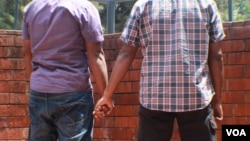In early September, the Anglican Church of Kenya revoked a priest’s license and suspended four others for alleged homosexual activity. It sent a message that there is no room for homosexuality at churches in Kenya.
But there is one place where members of the LGBT community - that is lesbians, gays, bisexual and transgender people - are welcome for Sunday worship.
Lilian, for whom this is not her regular church, sits in the back. The 28-year-old is lesbian.
“For a long time, I had not attended normal church because I felt like the likes of me are not accepted," she said. "Many people don’t know that I am gay. If they knew, they would look at me differently. But I choose to go where I am accepted, where I do not have to hide my identity.”
In central Nairobi, just one church welcomes people like Kimani.
Reverend Barasa Makokha ministers to sexual minorities. The father of four has been threatened several times but he persists.
“It will be wrong for any clergy to preach a message that can create some spiritual violence in terms of excluding people, in terms of judging people and in terms of making people even hate themselves, especially the LGBT people, because the church needs to change its perspective, and the church also needs to understand the LGBT people,” he said.
But other priests disagree. They say alternative churches are not the answer.
Reverend Silaz Mukulwa of the Anglican Church says ministers should steer gay people toward straight lives.
“A man should not sexually involve himself with another man. That is evil and if any church engages in such things, the church is not worshipping the living God because God’s teachings is against it,” Mukulwa said.
President Barack Obama, during his visit to Kenya in July, argued for equal rights for members of the LGBT community. His Kenyan counterpart, Uhuru Kenyatta, described it a non-issue.
Homosexuality is illegal in at least 36 African countries, including Kenya. Penalties include prison and fines.
Many cite religious and cultural beliefs to justify their opposition to what they see as a sexual aberration.
But for Makokha's small congregation, the weekly worship service provides for many a moment of peace, free of discrimination.




